#those whose lives are restricted by that power having to struggle to find any narratives that provide some comfort maybe
Text
also to go "wow this is just like in pentiment" about absolutely anything and/or "wow this is just like iphigenia crash land falls on the neon shell that was once her heart (a rave fable)" about absolutely anything further:
the Narratives within crash land falls where like, in the end iphigenia being Given the story of both "this is going to happen anyways" and "so why don't you see it as a noble sacrifice to accept." the situation happening to Create a story that she was killed, so her father must be tragic, and sympathetic. that iphigenia does take on that Narrative of taking on the Noble Willing Sacrifice, and it kills her, but she also would have been killed anyways, as everyone also knows. that we even get a bit of pentimentesque [other characters observe & assess things] like, the fresa girls as a chorus, and one at the end like yeah She Was No Saint, i saw everything, but being cut off by The News that's like yeah looks like iphigenia was killed, that seguing into her father saying yeah she was killed, god's will was done, She's A Saint now. seguing to the emcee who introduced the play, but that superceded by achilles, and that superceded with iphigenia's extasis monologue as the end of the play. that whether iphigenia's a saint or not, she dies. that [the whole play] tells us as much, like, this isn't a What If kind of retelling where she escapes her fate, this is a retelling examining itself like, she Will die because the story's preset, so what to do with this as the story that has to take her there, what to do with this as iphigenia who has to go there
that iphigenia takes on another narrative in addition to the one offered by like, violeta as guide and oracle telling her she has to die (As A Noble Sacrifice), that again (as per iphigenia in aulis being like uh hey daughter. let's go to aulis so you can uh marry achilles (it is to be sacrificed)) achilles is this bait, but it's only in the ending that there's any Story about being with achilles, and when iphigenia goes to the mercenary soldier who she knows will kill her, she's the one telling him what to tell her about where she's going and why, i want you to tell me achilles is waiting for me....and she still dies, because This Is The Story. as also applied to the reality, iphigenia as another dead and missing girl following & preceding many; any disappeared deaths when consumed as disposable & replaceable, not given part of any narrative about it. while also iphigenia only gets a chorus of fresa girls from there being crosses put on the factory wall with their names, with one girl even remarking like hey they spelled my name right for once. but at the same time they're also like, both mere Apparitions but also like standins for people who are simply alive. real [shades]esque kind of, i suppose, but like they're not Sanctified for dying either, they'll comment on iphigenia but not with any like, divine knowledge, just as this out of place rich girl. whether iphigenia's A Saint or Not A Saint, she's still dead either way. she wants to be a fresa girl, they maybe want to be her, but everyone's doomed anyways thanks to way larger forces and the Stories that have been told and will be told again
but there's also the moment right before the final section wherein, before she's having to say what she wants within the bounds of [she has to die], there's achilles asking "you still want me" and iphigenia answering with "i want everything" and her vision for, like, getting to be alive actually, i'm on the gulf where the sea is gray, and no one wants a piece of me....the whole inciting event here where iphigenia wants to evade her fate however she can, exiting the bounds of her life, the physical bounds and the family unit and walking away from the rank of status / class / wealth, trying for [have her body for herself] and what the body wants, the sensuous indulgences of (a rave fable), let's hear some more about the roman state like "we don't like the examination and challenge and upending of class and convention in a bacchanalia, so only do the official versions we permit;" the Threat of people's desires for themselves, when that's going to be counter to those in power who'd want these people to be resources at their disposal; the burden on the disempowered to suffer [the only way out is through] with the Additional pain & loss that has to be taken on in pursuit of their autonomy, while also of course suffering for the autonomy they lack, that restricted and controlled and mitigated versions of what you might want are deigned to be provided or permitted so that you have Something, but that everyone's actual undeniable personhood will always be spilling past those bounds, the potential power of transgressive pleasure when one's wellbeing and autonomous choices are counter to the power structures that have to constantly try to suppress and preclude this. achilles just as bait, doomed to die like iphigenia is also still doomed, sex was never going to save everyone and the [recognizing connection as these two parallel people / We're The Same] with your lover here is not going to save everyone but it still makes more things possible for them both; iphigenia does know what she wants, and gets some of it because she wants it, same with achilles in turn, while it can't save anyone from their fates still. but it can mean something even if it doesn't transcend, like even a fleeting night of insignificant dancing that doesn't change anything can mean something, and we all die, but that doesn't mean it's Nothing to be killed any more than it's Nothing to have your desires or choices one way or another to be wrung out of your life before you are
anyways, the stories. the Looking and Presenting here. achilles and iphigenia first encountering each other as images put together and presented by someone else for their own purposes. the presence of what's seen through film/camera/recording versus in person; the potential power relations and even violence in framing, presenting, and the intended looking and assessing. repeated language about eyes/looks that burn, while also that connection between iphigenia and achilles, and their finding the least room in what they do have of their lives for more of their own wants and selves and something genuine and not predetermined, is also connected to eyes and looking and being seen and light and burning. while they're also connected to the protection and possibility of night and darkness, getting to exist and be Without being lit up or seen; that with the power that's still in play, it's never like, well then you should have nothing / no reason to hide; the penultimate moment in the play with achilles being one that's in person and fades into darkness, rather than coming in from the light of a projection / video onscreen as the introduction....iphigenia needing to be guided through a crossroads to even get to achilles in person; violeta giving the Advice and Story and Tradition to pray to eleggua, as iphigenia does before getting to encounter achilles for real, who also doesn't get to break out of a role or a fate in full in any way, but their tragedies are like, pointing towards [autonomy, imagine it] in both the ways they manage to find a little bit of it for themselves, in no small part for simply recognizing each other as in the same boat here, and in the ways they still don't have it and still can't get it
and anyways it's also inevitably saying like, telling a story?? this Play is a told story!! looking? assessing? interpreting? you're doing that in the course of experiencing it! and it's really so fucking true.
#reading the whole of it like okay well i'm different forever now then#tearing a wall down about it like yeah it's extremely chill thanks#iphigenia crash land falls on the neon shell that was once her heart (a rave fable)#what a Narrative can change; what it can't....#those already with the power to do whatever they felt like in the first place just able to create whatever story of events supports that#those whose lives are restricted by that power having to struggle to find any narratives that provide some comfort maybe#whilest perhaps it's the stories that provide an accurate reflection on the pain & suffering in one's reality that are more threatening Lol#like hey i hope that that bacchanalia isn't satiriz....paused to look up ''if satire is based on satyr i'll mclose it lmfao''#Apparently it's not Really; but the latin form was indeed influenced by the greek satyr (for the theatre of it all) on the Mistaken notion#that that Was an influence. so; anyways i hope that bacchanalia isn't satirizing norms & conventions & providing a space to transgress#wherein we can see the Constructed and Enforced nature of things like class such that it can be deconstructed & deenforced#you'd Better not be questioning these conventions by commenting on them even indirectly; playfully; or via imitation....#that achilles can only have this genuine final closeness with iphigenia after voicing & sharing ''i'm dying soon too btw (:''#while iphigenia able to voice what she wants from life is only happening with the context that she'll die & she won't have this#she knows she wants [and nobody wants a piece of me] b/c of knowing that they do; and they'll take it....#their navigating their connection via also rejecting / superseding Their Image(tm). i want to kill the tabloid girl that envelops your skin#i will sink & get rid of every inch of me. that at the end of their scenes of actually interacting it's iphigenia reassuring achilles#who's like [but you wouldn't want Me] [everyone only wants a piece of me] [you'll forget me] vs i will destroy your celebrity; there will#be no one left to adore but me....unmaking oneself in the face of being defined & doomed Already; by the past....#breaking into pieces crash land falling. if you existed once ever that exists forever. the pieces all around & as the foundation#making one's way back around to ''wow just like in pentiment'' again lol....endless things to say all around#as well as when anytime you have something to say you have about a trillion words in the effort to do so#the narrative that matters to you but doesn't save your life still giving you More life while you still have it....#and what gives a little more life than that. and a little more than that
4 notes
·
View notes
Text
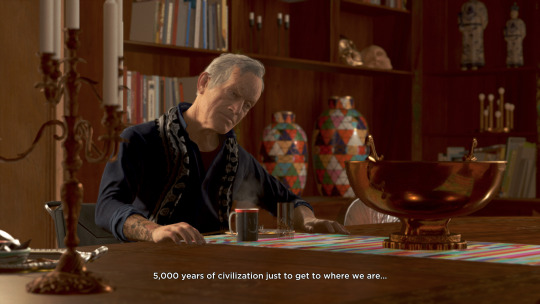
Certainly Detroit: become human has a strong component of the concept of parenthood, giving a narrative place where to think about what it is, how it is such relationship, and how humans and androids conceptualise it.
Parenthood is not an alien concept to explore with android themes because it's all about the concept of creator and creation, a relationship that despite being based on power it has been taught to us to mixture it with the concept of parenthood through religion. Talking about creators is almost the same as talking about parents, despite the nature of each relationship is quite different.
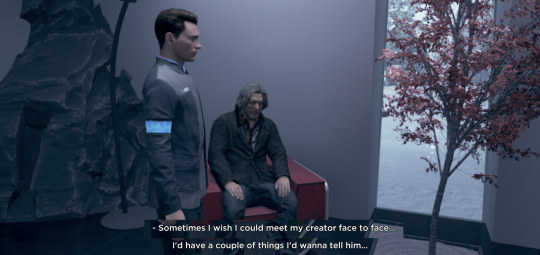
[Spoilers ahead]
Edit 1: I went wild and wrote a big meta.
Edit 2: Ok... I was carried away a little bit, I guess....
Edit 3: I’ll stop editing this, otherwise it will be endless.
Edit 4: Ok. I’ll stop. I promise.
In our western society, parenthood has been always taught by generation as a unique bond between people sharing blood, but Detroit become human explores it a bit further.
On one hand we see Carl, dealing with his addict biological son who only seeks his father for money. He is jealous of Markus, though. Despite sharing blood, Carl is quite clear that he doesn't favour his own son much, and his main link is with Markus. It’s him who is his son, because there is a lot of Carl in Markus himself.
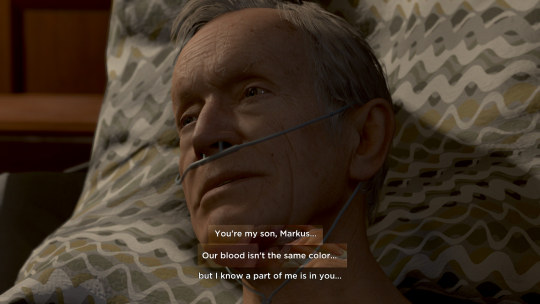
Carl nurtured Markus with good treatments, with knowledge, with books, with art. An endless list of good stimuli. He encouraged him to practice philosophy and to paint. Despite lacking of those skills in his software, Markus becomes a kind of novel intelectual, and turns out to be a “human” deeply influenced by Carl, knowing about the world from this bubble of culture and art that Carl made for him.

Carl taught him that he doesn't need to reproduce reality, that he can show (with art) something that nobody else sees in this reality, something that it doesn't exist, something that can change reality itself. Art is about wanting a different reality, interpreting it, improving it, and hoping to change it. We see every bit of this later in Markus' actions. For that reason he is the rebel leader in this game. And he is also Carl's son. There is a lot of Carl in Markus himself.
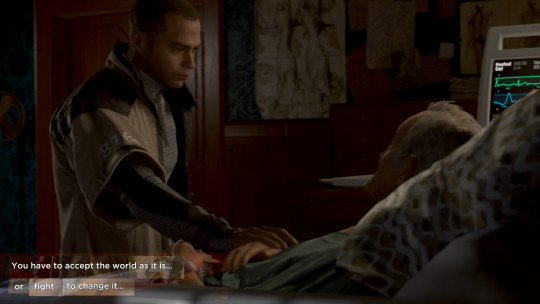
The sentiment is mutual. Markus loves Carl, he worries for him, cares for him, he even missed Carl (androids missing people!) and seeks his advice when he is lost. And Carl, despite the pain of the situation with his biological son, protects Markus as a parent does and never fears him (he leaves his house open to Markus, letting the house software recognise him in a friendly way). Nothing of their relationship has to do with blood, but their father-son relationship is there. It's impossible to deny it.
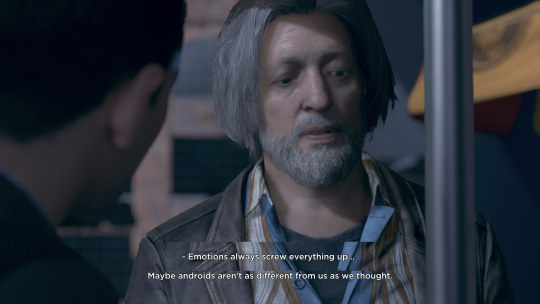
The parallel of their father-son concept reappears strongly in Connor and Hank's relationship. Slowly, we see how Hank starts to influence Connor with his words and actions to the point when Connor starts to adopt Hank's gestures. These small details bring Carl's words straight into their scenes: “You are my son, there is so much of me in you.” And Hank notices this. But instead of Arts and doubts and identity, it's emotions what Connor takes from Hank. Because Hank is a mess of emotions.
Hank is an old man, grumpy and tired but emotional. I quite find strange when people seem to see him like a stereotypical “hard-boiled” man. He is a fucking emotional mess quite far away from any concept of “stoic char”! XD Sure, he shows a lot of grumpiness and asocial behaviour (mostly due to his deep depression), but he is not the stone-char. He is incredible sensitive to Connor's treatment. The more Connor treats him poorly and tactlessly, the worse he reacts.
It’s true that it’s hard to judge Hank’s real behaviour because he is interacting with an android, not another human, but he lets his emotions run free quite often. It’s not like we, as players, struggle too much to see what he is feeling in any moment. Sure, there is a deep grudge against androids that makes him react strongly negative to them, so he looks more aggressive to them than when interacting with other humans. He hates machines, but he is absolutely a pro-emotion char. We know this not only by his face, which is an open window to all his emotional states, but also for his behaviour and words.
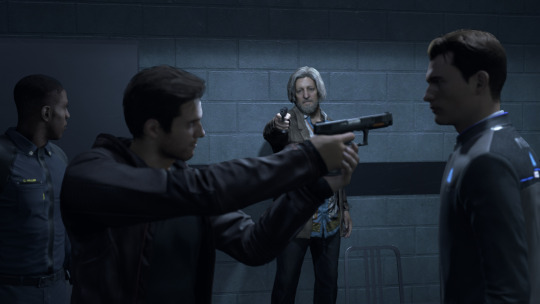
During the first case, in the interrogatory , he has a decent scene despite being in front of an android (I was expecting high levels of violence against the android). He is not the one thinking in torturing the android-killer. He cares for the way the android is treated during the interrogatory when he supports Connor in his request to not touch the killer. Even before interacting much with Connor, he respects androids despite his personal grudge (which always surprised me a lot, which makes me suspect that he is thinking in androids as living creatures quite early in the game).
The whole club scene is him grumpy-ing about how humans don't want relationships anymore because they don’t want to deal with the feelings of the other partner (he explicitly said that).

He says this after a scene before when Connor saw he was reading these:
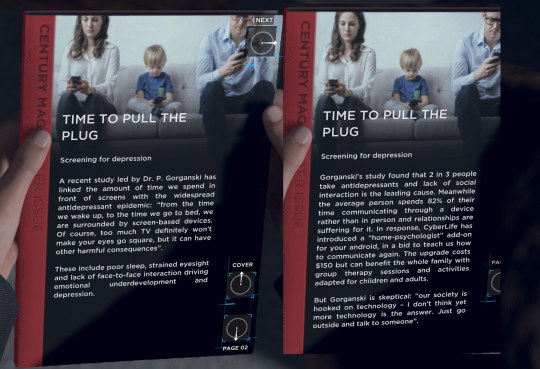
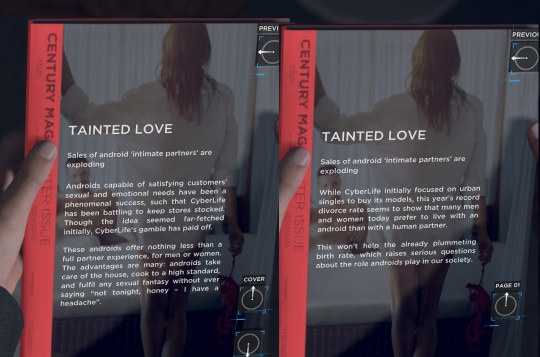
He is also the main one in defending the lesbian androids' love. Which is another thing that surprised me. I was expecting his crappy grumpy “old ideas” there, but he was clearly surprised and a bit pleased that he identified love in them.
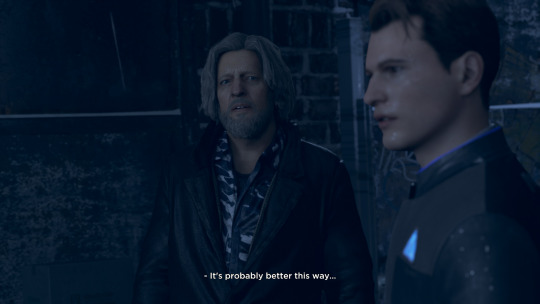
I insist, his char is more emotion-sensitive than he truly shows because his depression.
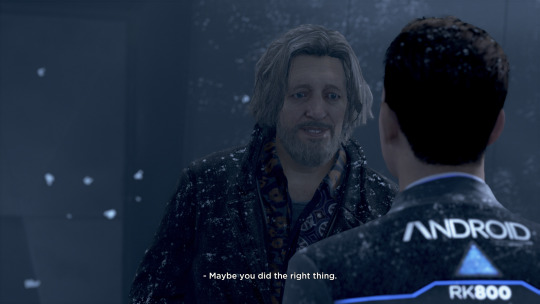
He hates a too rational or too robotic Connor, but he warms quickly when he sees that Connor can empathise and feel and be confused. He loves androids getting emotional.
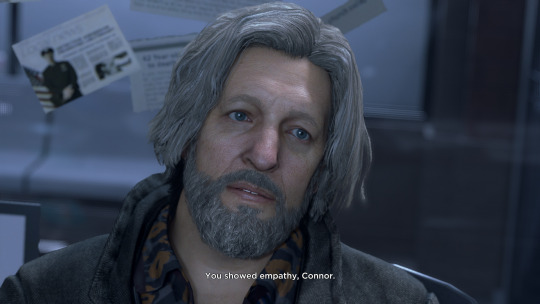
Hank is a wrecked man whose depression make him look like a “hard-boiled” char but he is far from that. I won't say he is an Ifan 2, of course not, but he is clearly more into emotions than any standard stoic grizzled char. He became asocial because he is tired of how this world works, and a senseless guilt for his son’s death is killing him. He is, after all, into a deep state of depression since he doesn’t care about hiding his suicidal tendencies and his alcoholism. Those things obscure his personality a bit.
In fact, making more parallels, he and Carl share with their android-sons the opinion that this human world is crappy as fuck.They know the world crafted by humans is dark and cruel.

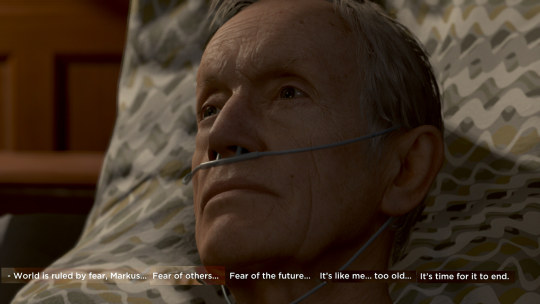
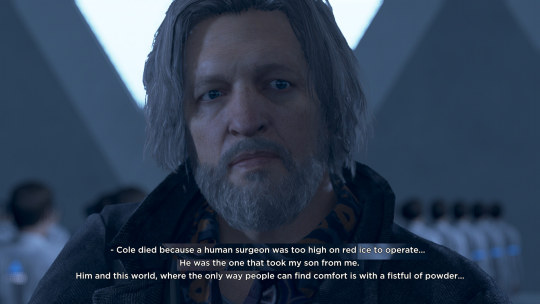
Carl and Hank have their own parallels as characters, they work as fathers in their relationship with their android-sons, they are also part of that dark world they despise (Carl is a rich person but too lonely in a world that doesn’t understand his “difference” (as a disable person as well as an artist); Hank is a person lost in addictions, in similar addictions that took his son from him). Putting aside their own personalities (which both are sensitive, but in different contexts), both of them greatly influence their son-androids, wishing for a better world for them, because the human one is terrible to them. They truly want to believe that a world made by androids could be a bit better.
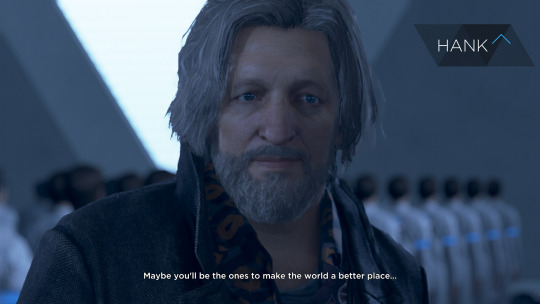
It’s also their bond with their android-sons what keeps them alive. Markus was the one giving medicines to Carl in the beginning. It’s also Markus to whom Carl waited for before finally giving up to his ill body. Hank keeps enduring his disaster depression and suicidal tendencies just because Connor keeps him a bit sane. Connection is deeply important in these stories, because in both cases, if the androids remain “too machine”, Hank ends up committing suicide and Carl dies earlier. Their relationships with their android-sons are vital to both. [Check this video about Hank’s endings if he loses faith in androids]
Carl worries for the future of Markus once he is dead, for that reason he kept telling him that he needs to make his own decisions and be his own man. Hank, too, worries for Connor's future, so he becomes a supporter of deviants to the point to tell Connor that his life does not matter if it puts at risk the revolution that was going to be the future of Connor's people. The worry of the future of their android sons is shared.
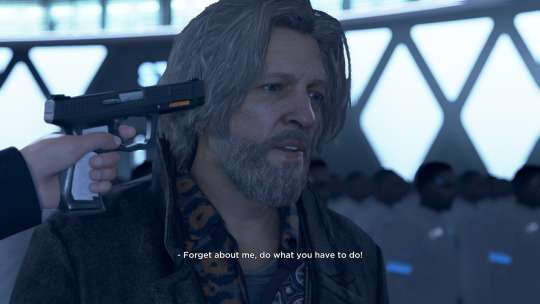
Carl and Hank have a strong desire for their “biological sons” to be androids or like them. In Carl’s case is obvious, his son is a shame and a disappointment to him, and he explicitly says that Markus is his son instead.
In Hank’s case is the hell of a more complex sentiment. He has a deep wound related to his biological son. Connor being replaced with every death hits right into this wound, this constant reminder that his son is dead while this fucked up android can return over and over. The desire for his son to be an android that can be immortal hits him (which is a contradiction in itself, because he hates androids!), and probably this inner-silent cognitive dissonance makes him a bit more aggressive and sarcastic than usual. He is deeply affected by this fact, and still yet, in every death, he cares for Connor (if their relationship goes friendly).
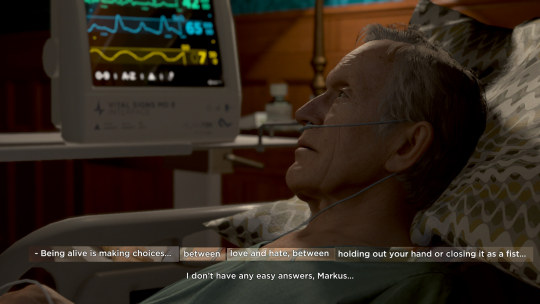
I particularly love his dirty relationship with Connor, because it's not purely fatherly love, it's also plain hate towards androids that, he thought, were the responsible of his son’s death. It's such a breaking point for Hank himself to start caring for an android as if it were a “kind of” son. I like to think in it as if it were the human equivalent of the “breaking the wall of the restrictive software” that we see in androids. Hank has this personal breaking point when he starts to care for deviant Connor.
All these small parallels are not by chance. It's a narrative well thought and every detail has been put there carefully. Clearly, androids of this intelligence are alive in its own way, and their parent-like relationship that they can establish with humans is as similar as the ones exclusively done between humans.
And this bond is as important as a human one, and it’s mutual. This bond doesn’t keep the humans alive only. We see that in the last scenes, it helps the androids to live too! when bonding with Hank determines if Connor knows about Cole or not, and that can end up in Connor’s destruction or Connor being saved. In that point, the mutual relationship of saving each other is based exclusively in how much they know each other, in how deeply they bonded and cared for one another.
The final scene is a testament of how bonding works, how interactions change people, and how little it has to do with humans alone or androids.
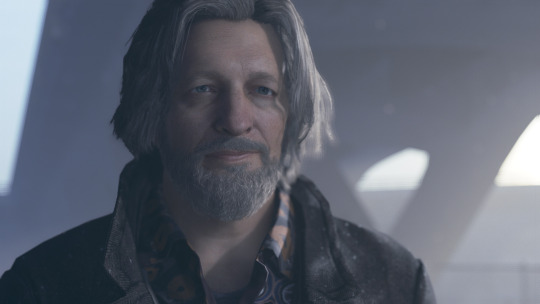

Then, we have Kara’s story. This story drifts a bit with the parallels found before, but still yet it works with the concept of parenthood.
She starts as a housekeeper/ children caregiver android and ends up as a mother. At first we believe that this is another of those parent-child relationship that we saw with Carl and Markus, but in the other way around, where the child is the human and the parent is the android. But by the end, we realise both are androids. Both chars bond like parent-child despite having no blood at all.
Probably this story is the weirdest of the three relationships because in the end, in both of them, the software is what led this relationship. I mean, it’s my way to interpret it at least. Alice was made to be a perfect child while Kara is the perfect mother for our capitalist standards (her model is made to be a house worker plus caregiver of children). So, to me, their relationship is not exactly challenging for them... they are working like their software was intended to; the only “anomalous” thing in this story is that they fullfil an android’s needs instead of a human’s. In fact, in this story, the only one challenging his software is Luther, who also becomes a parent in this android family when his model has nothing to do with protection or care-giving.
He speaks about becoming what others need; which is not the case of Alice or Kara (this confused me a lot during their story). They are working accordingly their models; but it’s Luther who challenges his own model. Luther’s words describe his own story, not Alice and Kara’s.
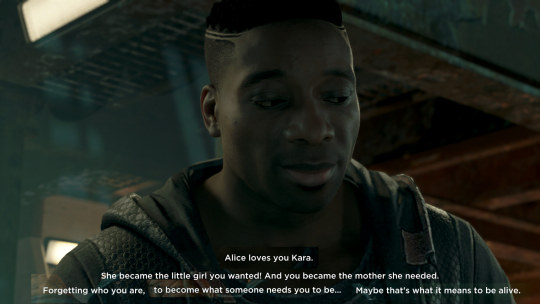
When it comes to the conceptualisation of parenthood, Kara's story felt to me like a mere reproduction of the human concept. I didn't find it quite challenging, since Kara and Alice are programmed for it. The only new concept in their story is that they feel fulfilled interacting only between them. It’s like they don’t need humans to feel happy and loved. They can find that among other androids, they can learn from other androids, I think this is the concept to explore with them. Parenthood exclusively among androids. A concept of static family too; since they will live forever in the bubble of the perfect human family, showing that androids can also want to make families, that they claim not to be like human ones, but the hell they look like similar XD.
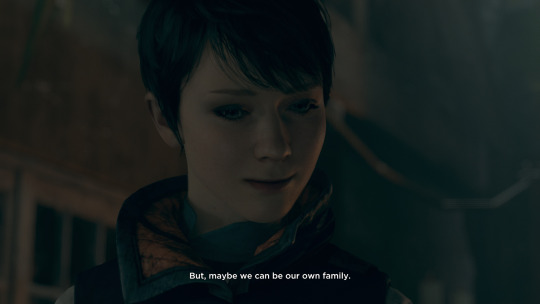
I mean, I liked it, but it doesn't bring any challenging idea to the parenthood concept beyond the fact that, clearly, some androids want to be family between them, without humans in the middle. In Kara’s story, that family is pretty humanly-standard and humanly-typical (putting aside the racial compound).
In a more challenging way, the couple of lesbians in the nocturnal club breaks more their software in that sense. They stop pleasing humans sexually and enduring disgusting human bodies, break their code, love each other, and want to make a family by their own, far away from humans.
With Kara, I think we explore more the concept of being or becoming someone for the sake of someone else, but this concept is not present IN Kara or Alice, but in Luther. From a heavy loading machine, he became a protector, a guardian, a kind of father in his own android way. I loved that challenge in his char, but I personally think this is a dangerous concept if it goes too far in humans. Nothing good comes from changing too much oneself, disfiguring oneself identity, to please another one. Maybe the parallel here is with Markus and Luther, both of them crafting their own identity, and part of it is a result of turning what others need. Yes, there is something of the like there, in those two chars when it comes to identity.
I find this dangerous concept kind of ok in this particular case of Luther, in an android context, because it gives him control over himself; it’s his decision in the end, and it’s what gives him his identity, but I feel it’s a dangerous concept that maybe needed a bit more of exploration and some more parallels? I don’t know. I feel it needed more development there, specially because Kara and Alice are not example of this concept, quite on the contrary. They keep pretty fair to their models.
Kara’s story has no parallels with the other two beyond the fact that her motherly love keeps her going on. Or at least, I don’t see them. To me, it’s quite confusing that they stick to their program, yet Luther and the whole story of Kara is about changing oneself to become what other needs.
In a sense, Kara and Alice are accepting their software/nature, just not to satisfy any human, but another android. And Luther is the one taking this concept to the limit; he is now his own persona. This decision is a proof of being alive, becoming his family’s protector despite not being his model's main goal.
#detroit become human#hank anderson#connor#markus#carl#luther#I know I know.... i was carried fucking away#a super meta I guess...#probably nobody will read this crap.... who in his sanity would do it? XD#god why I write so much....
19 notes
·
View notes
Text
Disability Studies
MUSIC GOT ME HERE
Director: Susan Koch
Music Got Me Here follows the against-all-odds, true-life journey of Forrest Allen - a story of the power of music to heal and transform lives, often in miraculous ways. A snowboard accident leaves Forrest, age 18, trapped inside himself, unable to speak or walk for almost two years. Tom Sweitzer, an eccentric music therapist with a troubled childhood who credits music with saving his own life, is determined to help Forrest find his voice.
Ancient philosophers, including Plato, Aristotle and Socrates, recognized and wrote about the tremendous power of music. But it's only recently that neuroscientists, using advanced magnetic resonance imaging, have been able to go beyond the anecdotal - and actually document the powerful pathways that exist between music and the brain. Music therapy has the potential to improve the lives of those dealing with some of life's most serious challenges including traumatic brain injuries, Alzheimer's, autism, Parkinson's, cerebral palsy, mental health issues, PTSD, stroke recovery, pain management, and opioid addiction.
Filmed over five years by award-winning director Susan Koch, Music Got Me Here explores this fascinating therapy through the story of Forrest, featuring interviews with renowned soprano and music therapy advocate Renee Fleming and National Institutes of Health Director Dr. Francis Collins.
DVD / 2020 / 90 minutes
R-WORD, THE
By Amanda Lukoff
THE R-WORD is an intimate look at the history of the word 'retard(ed),' cultural representation, and the challenges and triumphs of people living with intellectual and developmental disabilities.
Filmmaker Amanda Lukoff grew up advocating for her sister Gabrielle, especially whenever she heard the word 'retard(ed),' which was far too often. The disparaging word is everywhere – in TV, movies, music, social media, and throughout our public and private communities -- perpetuating negative stereotypes and cultural bias.
THE R-WORD is a humanizing, purposeful, and deeply respectful look into the long-reaching history and lasting implications of derogatory language used to describe people with intellectual and developmental disabilities. Through captivating animation sequences, the personal narrative of four sibling stories, and the first-person accounts of self-advocates, we get an intimate and nuanced perspective of the challenges and triumphs of people living with an intellectual disability.
THE R-WORD is an unflinching, heartwarming, humorous, and hopeful journey through our shared human experience.
DVD (Color, Closed Captioned) / 2020 / 65 minutes
TO BE OF SERVICE
Director: Josh Aronson
To Be Of Service is a feature-length documentary directed by Academy Award nominated Josh Aronson about veterans suffering from Post Traumatic Stress Disorder (PTSD) who are paired with a service dog to help them regain their lives. Returning home for these vets is often wrought with depression and a painful disconnect from the world they once knew. Family, old friends and jobs seem foreign, and newly returned warriors struggle to function and return to a normal civilian life. "To Be Of Service" follows these warriors after they get their dog to see how a deeply bonded friendship restores independence and love for the men and women who have been so traumatized by war. The film features an original song, "Unbroken," written and performed by Jon Bon Jovi.
DVD / 2019 / 88 minutes
THAT WAY MADNESS LIES
Director: Sandra Luckow
What do you do when your brother descends into a black hole of mental instability - starting with falling for a Nigerian email scam but eventually winding up involuntary committed into the hospital made famous by 'One Flew Over the Cuckoo's Nest'?
Award-winning filmmaker Sandra Luckow unflinchingly turns her camera on her own family as they attempt to navigate the broken mental health system in an effort to save their brother, Duanne, whose iPhone video diary ultimately becomes an unfiltered look at the mind of a man with untreated schizophrenia as well as an indictment of how the system failed.
DVD / 2018 / 101 minutes
DEFIANT LIVES
By Sarah Barton
DEFIANT LIVES is a triumphant film that traces the origins of the world-wide disability rights movement. It tells the stories of the individuals who bravely put their lives on the line to create a better world where everyone is valued and can participate. Featuring interviews and rarely seen archival footage, the film reveals how these activists fought to live outside of institutions, challenged the stigmas and negative image of disability portrayed by the media, demanded access to public transportation, and battled to reframe disability rights as a social responsibility relevant to us all. DEFIANT LIVES is an excellent tool to encourage discussions about diversity and disability for students, audiences and community groups.
DVD (Color) / 2017 / 85 minutes
MADEMOISELLE PARADIS
Director: Barbara Albert
Set in 18th century Vienna, this is the true story of Maria Theresia von Paradis, a gifted piano player and close friend of Mozart, who lost her eye-sight as a child. Desperate to cure their talented daughter, the Paradis entrust Maria to Dr. Mesmer, a forward-thinking-physician who gives her the care and attention that she requires. With the doctor's innovative techniques of magnetism, Maria slowly recovers her sight. But this miracle comes at a price as the woman progressively starts to lose her gift for music. Faced with a heavy dilemma, Mademoiselle Paradis will have to choose: an ordinary life in the light or an extraordinary life in darkness, as a virtuoso.
DVD (German & French with English subtitles) / 2017 / 97 minutes
SHADOW GIRL
By Maria Teresa Larrain
SHADOW GIRL is the extraordinary story of a filmmaker struggling with the prospect of losing her vision. While editing her last film in Toronto, Chilean-born filmmaker Maria Teresa Larrain suddenly begins to go blind. After she's denied disability benefits by the Canadian government, she returns home to Chile. There, inspired by the resilience and wisdom of the blind street vendors she meets, Maria Teresa confronts her fears and steps courageously into her new life while reclaiming her dignity and her voice as an artist. This powerful and poetic film raises complex questions about art and "vision," able and dis-abled, and poverty and privilege.
DVD (Spanish, Color) / 2017 / 75 minutes
BEST AND MOST BEAUTIFUL THINGS
Director: Garrett Zevgetis
Off a dirt road in rural Maine, a precocious 20-year-old woman named Michelle Smith lives with her mother Julie. Michelle is quirky and charming, legally blind and diagnosed on the autism spectrum, with big dreams and varied passions. Searching for connection, Michelle explores love and empowerment outside the limits of "normal" through a provocative sex-positive community. Michelle's joyful story of self-discovery celebrates outcasts everywhere.
DVD / 2016 / 91 minutes
FAREWELL PARTY, THE
Director: Tal Granit & Sharon Maymon
The Farewell Party is a unique, compassionate and unlikely funny story of a group of friends at a Jerusalem retirement home who decide to help their terminally ill friend. When rumors of their assistance begin to spread, more and more people ask for their help, and the friends are faced with a life and death dilemma. Co-directors Sharon Maymon and Tal Granit have tackled an extremely sensitive issue in a vibrant and unique way.
DVD (Hebrew with English subtitles) / 2015 / 95 minutes
ON BEAUTY
By Joanna Rudnick
From Emmy-nominated IN THE FAMILY filmmaker Joanna Rudnick and Chicago's Kartemquin Films comes a story about challenging norms and redefining beauty. ON BEAUTY follows fashion photographer Rick Guidotti, who left the fashion world when he grew frustrated with having to work within the restrictive parameters of the industry's standard of beauty. After a chance encounter with a young woman who had the genetic condition albinism, Rick re-focused his lens on those too often relegated to the shadows to change the way we see and experience beauty.
At the center of ON BEAUTY are two of Rick's photo subjects: Sarah and Jayne. In eighth grade Sarah left public school because she was bullied so harshly for the birthmark on her face and brain. Jayne lives with albinism in Eastern Africa where society is blind to her unique health and safety needs and where witch doctors hunt people with her condition to sell their body parts. We follow Rick as he uses his lens to challenge convention and media's narrow scope of with the help of two extraordinary women.
DVD (Color) / 2015 / 31 minutes
DANCE GOODBYE, THE
Director: Ron Steinman
What is life like for a dancer when they can no longer dance? Inspired by Merrill Ashley's departure from the New York City Ballet as an acclaimed principal dancer, this documentary, created by Ron Steinman and Eileen Douglas, captures the poignancy of this life turning point. After a struggle to find her next step, today Merrill Ashley travels around the world teaching Balanchine to dance companies which perform his works as once she did. This is the story of any dancer - or, in truth any one of us - who needs to find their way into a new life.
DVD / 2014 / 56 minutes
MAKING ROUNDS
Director: Muffie Meyer
We spend almost a trillion dollars a year on high-tech tests and yet almost one fifth of patients are misdiagnosed. In Making Rounds we are introduced to the power and superiority of methods of traditional diagnosis based on decades of experience, doctor-patient discussions, physical touch, and personal observation. We follow two prominent cardiologists getting it right, teaching future doctors the 'old-fashion' art and science of a thorough bedside physical exam. "A great many diseases may be diagnosed," they tell us, "just by looking at a patient's hand."
Filmed over one month in the cardiac care unit of a top New York hospital, we see the doctors in action, correcting previous misdiagnoses, predicting outcomes, saving lives, demonstrating - in dramatic real-world situations -that simply looking at and listening to patients remains medicine's most indispensable tool.
DVD / 2014 / 63 minutes
ALGORITHMS
Director: Ian McDonald
In India, a group of boys dream of becoming Chess Masters, driven by a man with a vision. But this is no ordinary chess and these are no ordinary players. Algorithms is a documentary on the thriving but little known world of Blind Chess in India.
Filmed over three years, Algorithms travels with three talented boys and a totally blind player turned pioneer as they compete in national and world championships, and visits them in their home milieu where they reveal their struggles, anxieties and hopes.
Charudatta Jadhav discovered chess soon after he went blind as a teen. Convinced of the game's power, he has dedicated his life to develop chess for the blind. Darpan Inani is the most talented and highest ranked totally blind player in India. This idiosyncratic and highly intelligent teenager possesses a wisdom that belies his young age. Sai Krishna is an ambitious rising star of blind chess in India. He is fun-loving, gregarious and makes friends easily, but there is a toughness to Sai's character. Anant Kumar Nayak, a promising new talent, is a gentle boy with an endearing if slightly eccentric personality. With a strong sense of moral duty and responsibility, the totally blind Anant struggles to balance chess and school. This observational documentary moves through the algorithms of the blind chess world, challenging the viewer with a tactile and thoughtful exploration of foresight, sight and vision.
DVD (English, Hindi, Tamil, Odiya with English subtitles) / 2012 / 96 minutes
SERVICE: WHEN WOMEN COME MARCHING HOME
By Marcia Rock and Patricia Lee Stotter
Women make up 15 percent of today's military. That number is expected to double in 10 years. SERVICE highlights the resourcefulness of seven amazing women who represent the first wave of mothers, daughters and sisters returning home from the frontless wars of Iraq and Afghanistan. Portraying the courage of women veterans as they transition from active duty to their civilian lives, this powerful film describes the horrific traumas they have faced, the inadequate care they often receive on return, and the large and small accomplishments they work mightily to achieve.
These are the stories we hear about from men returning from war, but rarely from women veterans. Through compelling portraits, we watch these women wrestle with prostheses, homelessness, Post Traumatic Stress Disorder and Military Sexual Trauma. The documentary takes the audience on a journey from the deserts of Afghanistan and Iraq to rural Tennessee and urban New York City, from coping with amputations, to flashbacks, triggers and depression to ways to support other vets. An eye-opening look at the specific challenges facing women veterans with a special focus on the disabled, SERVICE can be used for courses in military studies, women's studies, peace and conflict courses and veteran support groups.
DVD (Color) / 2012 / 55 minutes
YOU DON'T NEED FEET TO DANCE
Director: Alan Govenar
Alan Govenar's intimate new documentary reveals the extraordinary life of African immigrant Sidiki Conde, a man overcoming his disability one day at a time in New York City.
Sidiki was born in 1961, in Guinea, West Africa. At age fourteen, polio left him almost completely paralyzed. Sent to live with his grandfather in a village deep in the forest, Sidiki learned to manage his disability, building his upper-body strength so that he could walk on his hands. When faced with the dilemma of dancing in a coming of age ceremony, he reconstructed the traditional steps by dancing on his hands instead of his feet.
In time Sidiki ran away to Conakry, Guinea's capital city, where he and his friends organized an orchestra of artists with disabilities recruited from the city's streets. They toured the country, striving to change the perception of the disabled. In 1987, he became a member of the renowned dance company Merveilles D'Afrique, founded by Mohamed Komoko Sano. Sidiki became a soloist and served as rehearsal master, composing and directing the company's repertoire. He also worked as a musician and arranger with Youssou N'Dour, Salifa Keita, Baba Maal and other popular musicians.
In 1998, Conde's music brought him to the United States, and he founded the Tokounou All-Abilities Dance and Music Ensemble. In the United States, he has continued to perform and teach, instructing people of all abilities in schools, hospitals and universities, and served as artist in residence at a Bronx public school for children with multiple disabilities.
In You Don't Need Feet to Dance, Sidiki balances his career as a performing artist with the almost insurmountable obstacles of life in New York City, from his fifth-floor walk-up apartment in the East village, down the stairs with his hands and navigating in his wheelchair through Manhattan onto buses and into the subway. Despite the challenges, Sidiki teaches workshops for disabled kids, busks on the street, rehearses with his musical group, bicycles with his hands, and prepares for a baby naming ceremony, where he plays djembe drums, sings, and dances on his hands.
DVD / 2012 / 88 minutes
I CAN BE PRESIDENT
Directors: Diane Kolyer & Michael Sporn
What would it be like to grow up and become president of the United States?
In I Can Be President: A Kid's Eye View, a diverse group of children candidly share their thoughts on the subject, affirming the importance of having dreams at any age.
I Can Be President features interviews with elementary schoolers whose hopes and dreams - both hilarious and touching - come to life in animated sequences created by the award-winning animator Michael Sporn.
A young person's view of civics and ethics, I Can Be President offers simple yet profound observations on subjects like diversity, war, being a leader and becoming an adult. All in all, a promising vision of the nation's future.
DVD / 2011 / 22 minutes
SCARLET ROAD
By Catherine Scott
Impassioned about freedom of sexual expression, Australian sex worker Rachel Wotton has become highly specialized in working with clients with disabilities. Rachel's philosophy – that human tough and sexual intimacy can be some of the most therapeutic aspects to our existence – has made a dramatic impact on the lives of her clients, from improved mental health to actually regaining body movement. SCARLET ROAD follows Rachel as she strives to increase awareness and access to sexual expression for disabled people through her foundation, "Touching Base," which works to gain rights for sex workers and end the social stigma and discriminatory practices that surround their occupation. In addition, she obtains an MS in Sexual Health, all to further her mission to end the stigma placed on two marginalized groups.
DVD (Color) / 2011 / 70 minutes
IN THE GARDEN OF SOUNDS
Director: Nicole Bellucci
From the time he was a child Wolfgang Fasser knew he'd lose his eyesight to the genetic disease retinitus pigmentosa. But as darkness descended, a new world began to open up to him: the world of sound. He marveled at its richness and nuance, at how it moved him and made him connect with nature and with the people around him. Forced to abandon his childhood dream of being a veterinarian, Wolfgang instead became a musical therapist for disabled children.
Tucked away in the Swiss mountains he built a safe haven in which children can explore and create sound through instruments like cymbals, drums and piano, or feel sound vibrations resonate through their bodies on a therapeutic bed of chords. Tension dissipates as they open to the mysteries of sound and music; Wolfgang's empathy, compassion and patience add to an environment in which the children blossom. In his transcendent directorial debut, Nicola Bellucci focuses with quiet reverence on Wolfgang just as Wolfgang focuses on the children in his care.
DVD (Italian and Swiss German with English Subtitles) / 2010 / 90 minutes
MOTHER'S COURAGE, A: TALKING BACK TO AUTISM
Director: Fridrik Thor Fridriksson
Narrated by Kate Winslet, this inspiring film follows one woman's quest to unlock her autistic son's mind. Margret, whose ten-year-old son Keli is severely autistic, has tried a number of treatments to help her son.
Consumed by an unquenchable thirst for knowledge about this mysterious and complex condition, she travels from her home in Iceland to the United States and Europe, meeting with top autism experts and advocates. She also connects with several other families touched by autism, whose struggles echo her own: the endless doctor visits and experiments with different treatments, the complication of doing everyday tasks, and the inability to communicate - perhaps the most painful and frustrating aspect of autism.
But as she comes across innovative new therapies with the potential to break down the walls of autism, Margret finds hope that her son may be able to express himself on a level she never thought possible.
DVD / 2010 / 103 minutes
ABE NATHAN - AS THE SUN SETS
Director: Eytan Harris
The nostalgic and exciting story of Abe Nathan ("The Peace Pilot") - the man who became a myth in Israel and around the world for his courageous and endless fight for peace, who broadcasted rock music and messages of peace from his pirate radio station "The Voice of Peace", who organized missions, reaching forgotten corners of the world giving food to starving children, but at the same time could not be a real father to his own daughter.
DVD (Hebrew, English, With English Subtitles) / 2005 / 78 minutes
NITSAN AND SAGI
Directors: Hadassah Benherzel and Jacky Berman
Nitsan and Sagi married in Israel in August 2002. Their wedding was a magnificent and well-attended ceremony. However, unlike other couples, Nitsan and Sagi are young people with Down syndrome, and as such, their path to martial bliss became an ideal for a "normal" existence that many young people with Down syndrome pray and hope for. The film accompanies the couple on their wedding day and to their new home in an emotional, thought provoking and sometimes humorous fashion.
DVD (Hebrew, With English Translation) / 2004 / 58 minutes
http://www.learningemall.com/News/Disability_202101.html
0 notes
Photo

Amazon First Reads February 2021
Well I can’t believe January has already been and gone. So it’s that time again for Amazon Prime Members to choose one free book before it’s published next month. This month we have nine books to choose from.
This months choices are:
Mystery
The Deadly Mystery of the Missing Diamonds by T E Kinsey, Pages: 330, Publication Date: 1 March 2021

Synopsis: Missing diamonds. Mysterious deaths. And all that jazz.
London, 1925. With their band the Dizzy Heights, jazz musicians Ivor ‘Skins’ Maloney and Bartholomew ‘Barty’ Dunn are used to improvising as they play the Charleston for flappers and toffs, but things are about to take a surprising turn.
Superintendent Sunderland has had word that a deserter who stole a fortune in diamonds as he fled the war is a member of the Aristippus private members’ club in Mayfair—where the Dizzy Heights have a residency. And the thief is planning to steal a hoard of jewels hidden there under the cover of a dance contest.
As mutual pal Lady Hardcastle has suggested, Skins and Dunn are perfectly placed to be Sunderland’s eyes and ears—and Skins’s wife Ellie soon lends a hand with a bit of light snooping. But the stakes change dramatically when a mysterious death at the club brings a sinister note to the investigation.
With the dance contest fast approaching, the trio must solve the mystery of the missing diamonds, unmask the murderer, and prevent more deadly crimes—all without missing a beat.
Memoir
The Psychopath by Mary Turner Thomson, pages: 239, Publication Date: 1 March 2021

Synopsis: In 2006, Mary Turner Thomson’s world shattered when she discovered her husband Will was a bigamist, con man and convicted sex offender. Unbeknownst to her, this would be the start of a bold new chapter in her life, fighting to protect other women from his heartless gaslighting campaigns—and putting a stop to his endless deception.
Mary thought her story would end with the revelation that Will in fact had several families—and numerous children. But when she discovered that he had continued to prey on new victims, she vowed to turn his betrayal into a force for good. On her mission to protect these women and others, Mary also learned more about the psychopathy behind Will’s duplicitous behaviour.
Teaming up with his newest fiancée in the US, Mary attempts to put an end to Will’s devastating activities. But will she and her fellow victims succeed in their ultimate goal: to bring down Will Jordan forever?
Thriller
Infinite by Brian Freeman, Pages: 328, Publication Date: 1 March 2021

Synopsis: From bestselling author Brian Freeman comes an explosive new psychological thriller that pushes the limits of reality as we know it.
One rainy night, the unthinkable happens: Dylan Moran’s car plunges off the road into a raging river, his beautiful wife drowning as he struggles to shore.
In the aftermath, through his grief, Dylan experiences sudden, strange visions: wherever he goes, he’s haunted by glimpses of himself. Dylan initially chalks it up to trauma, but that changes when he runs into a psychiatrist who claims he’s her patient. She says he has been undergoing a unique hypnotherapy treatment built on the idea that with every choice, he creates an infinite number of parallel universes.
Now those parallel universes are unlocked—and Dylan’s doppelgänger has staked a claim to his world. Can Dylan use these alternate realities to get a second chance at the life that was stolen from him? Or will he lose himself…to himself?
Book Club Fiction
The Speed of Light by Elissa Grossell Dickey, Pages: 290, Publication Date: 1 March 2021
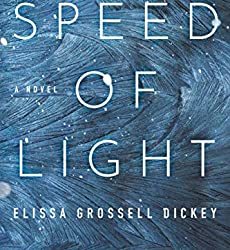
Synopsis: A compelling and provocative debut novel told in intersecting timelines over a tumultuous, defining year in one woman’s life.
Simone is trying her best not to think of what she’s lost. Diagnosed with MS, she awaits the results of another anxiety-inducing MRI. She’s just walked away from Connor, “a fixer” but possibly the love of her life. And nearing the holidays, the sights and sounds of winter in South Dakota only prick memories of better years gone by. Then, on a December morning at the university where she works, jarring gunshots pierce the halls. In a temporary safe place and terrified, Simone listens and pretends this will all be over soon.
As she waits for silence, her mind racing, Simone’s past year comes into focus. Falling in love and missing it. Finding strength in family and enduring friendships. Planning for the future, fearing it, and hoping against hope in dark places. Her life has been changing at the speed of light, and each crossroad brought Simone here, to this day, to endure the things she can’t control and to confront those that she can.
Romantic Comedy
The Wedding Game by Meghan Quinn, Pages: 397, Publication Date: 1 March 2021
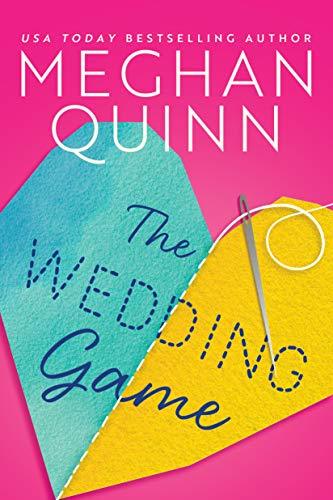
Synopsis: USA Today bestselling author Meghan Quinn’s latest bauble is the charming story of a crafting queen battling a jaded divorce lawyer on a wedding reality show.
Luna Rossi is a veritable crafting genius—she can bedazzle and bead so hard her Etsy site is one of the hottest in the world. So it’s only natural that Luna would convince her brother and his husband-to-be to compete on The Wedding Game, a “do-it-yourself” TV show, for the title of Top DIY Wedding Expert.
As a jaded divorce lawyer, Alec Baxter scoffs at weddings and romance. But when his recently engaged brother begs him to participate in The Wedding Game, Alec grudgingly picks up a glue gun and prepares for some family bonding.
Both fierce competitors, Luna and Alec clash on national TV as harsh words and glitter fly with abandon. But as they bicker over color swatches and mood boards, they find themselves fighting something else: their growing mutual attraction. While Luna is torn between family loyalty and her own feelings, Alec wonders if he might have been wrong about love and marriage all along…
Fantasy
Wings of Fury by Emily R King, Pages: 296, Publication Date: 1 March 2021
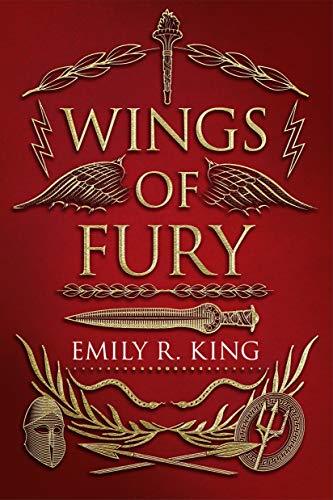
Synopsis: From Emily R. King, author of the Hundredth Queen series, comes an epic novel of ancient Greece, Titans and treachery, and the women who dare to rise up against the tyranny of the Golden Age.
My mother told me that men would speak about the Golden Age as a time of peace and happiness for all… However, the women of our age would tell a very different story…
Cronus, God of Gods, whose inheritance is the world. Among his possessions: women, imprisoned and fated to serve. The strong-minded Althea Lambros controls her own fate and lives to honor her dying mother’s plea to protect her two sisters at all costs. Althea’s journey toward crushing the tyranny has begun. It is a destiny foretold by the Fates. And she is following their visions.
On the southern isle of Crete, hidden among mortal women who have fled the Titans, is the Boy God, son of Cronus and believed dead. He shares Althea’s destiny to vanquish the Almighty—fate willing. Because Cronus has caught wind of the plot. He’s amassing his own forces against Althea’s righteous rebellion and all those who will no longer surrender or run. There will be war. If she’s to survive to write their history, the indomitable Althea must soar higher than any god.
Historical Fiction
After Alice Fell by Kim Taylor Blakemore, Pages: 287, Publication Date: 1 March 2021
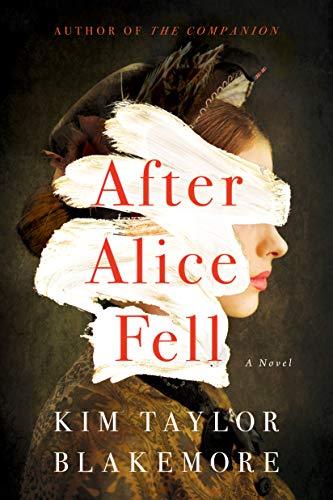
Synopsis: Until she discovers the truth of her sister’s death, no one will rest in peace.
New Hampshire, 1865. Marion Abbott is summoned to Brawders House asylum to collect the body of her sister, Alice. She’d been found dead after falling four stories from a steep-pitched roof. Officially: an accident. Confidentially: suicide. But Marion believes a third option: murder.
Returning to her family home to stay with her brother and his second wife, the recently widowed Marion is expected to quiet her feelings of guilt and grief—to let go of the dead and embrace the living. But that’s not easy in this house full of haunting memories.
Just when the search for the truth seems hopeless, a stranger approaches Marion with chilling words: I saw her fall.
Now Marion is more determined than ever to find out what happened that night at Brawders, and why. With no one she can trust, Marion may risk her own life to uncover the secrets buried with Alice in the family plot.
Memoir
Black Boy Out of Time by Hari Ziyad, Pages: 314, Publication Date: 1March 2021

Synopsis: An eloquent, restless, and enlightening memoir by one of the most thought-provoking journalists today about growing up Black and queer in America, reuniting with the past, and coming of age their own way.
One of nineteen children in a blended family, Hari Ziyad was raised by a Hindu Hare Kṛṣṇa mother and a Muslim father. Through reframing their own coming-of-age story, Ziyad takes readers on a powerful journey of growing up queer and Black in Cleveland, Ohio, and of navigating the equally complex path toward finding their true self in New York City. Exploring childhood, gender, race, and the trust that is built, broken, and repaired through generations, Ziyad investigates what it means to live beyond the limited narratives Black children are given and challenges the irreconcilable binaries that restrict them.
Heartwarming and heart-wrenching, radical and reflective, Hari Ziyad’s vital memoir is for the outcast, the unheard, the unborn, and the dead. It offers us a new way to think about survival and the necessary disruption of social norms. It looks back in tenderness as well as justified rage, forces us to address where we are now, and, born out of hope, illuminates the possibilities for the future.
Children’s Picture Book
Agnes’s Place by Marit Larsen, Illustration by Jenny Loulie, Translation by Kari Dickson, Pages: 44, Publication Date: 1 March 2021

Synopsis: Agnes knows she is at home before she even opens her eyes in the morning. The sounds and smells and people swirl around her—she always knows what everyone is up to in the tight-knit apartment building where she lives. But she also knows what it is like to be the only child in a place full of adults who never have time.
So when a little girl moves in to the building, Agnes is excited and sends her a subtle message. But the girl doesn’t respond. Then things start to change around Agnes’s place—and Agnes knows exactly who is to blame. It seems like the girl is interested in everyone except for Agnes!
Will Agnes and the new girl ever meet? And what secrets does the new girl hold? First published in Norway, this is a lovely story about home and belonging and how one person can transform our world.

*** Which book will you choose? I have no idea which book I’ll choose as there a couple of books that interest me this month. ***
#Amazon, #AmazonFirstReads, #Amazonkindle, #AmazonPrimeMembers, #BookClubFiction, #ChildrensPictureBook, #Fantasy, #HistoricalFiction, #Kindle, #KindleBooks, #Memoir, #Mystery, #RomanticComedy, #Thriller
0 notes
Text
reading + listening 08.10.20
When I say that my book consumption this week swung from the best 2020 has to offer so far to the absolute worst, I am not exaggerating in the least. Another wild ride from start to finish...
Love is a Rogue (Lenora Bell), ebook, ARC. Full review on NetGalley. LOVE IS A ROGUE was my first Lenora Bell book -- but clocking in at a solid B, it won't be my last. Beatrice is an able-enough heroine, distinguished by her love for etymology, books, and the etymological dictionary she's planning to write once she achieves full spinster status. All she needs to do is fail one more season with the ton to circumvent her mother's plan's to make an advantageous marriage. Ford, our dashing hero, enters the scene as a carpenter whose role overseeing the renovation of the duke's estate brings him into Beatrice's path. They collide with flirtatious results, and the fun continues when Beatrice hires Ford to renovate a bookshop she just-so-happens to have inherited from a dead aunt. Unbeknownst to Beatrice, the property brings Ford's past directly in-line with her present, and they unite to overcome the challenges posed by society, their personal demons, and Ford's dastardly grandfather.
For me, Beatrice's status as the duke's sister undermined the urgency of her final season in society; she doesn't have to marry to save the family fortune or escape a cruel family situation, and in fact, Beatrice quickly decides to play along and appease her mother, all the while knowing she'll reject any proposals and retire to the country in due course. So the stakes are not especially high from a cultural perspective, which deflated the conflict somewhat. Likewise, Ford's inner demons don't hold the same power over him that might seriously impact his actions; he's set to return to the Royal Navy any day now, but decides with zero fanfare that actually no, he'll decline another tour and stay land-locked, tyvm. How realistic would it have been to back out of military service? I can't say -- but it seems like this would have been a serviceable point of separation for Ford and Beatrice, that would have prolonged the third act and provided valuable tension. Because it's the third act that keeps LOVE IS A ROGUE from ascending higher in my estimation.
The Midnight Bargain (C.L. Polk), ebook, ARC. Full four-star review on NetGalley.
I unequivocally adored THE MIDNIGHT BARGAIN, the first I've read from author C.L. Polk. It's a little tricky to categorize this standalone fantasy romance, which takes place in a decidedly other world, but still calls on the culture of Regency-era England -- so to call it "historical" is misleading, but readers who enjoy historical romance will surely find the cultural mores in THE MIDNIGHT BARGAIN both familiar and compelling. Beatrice Clayborn is in town for her last Bargaining season -- a time for male sorcerers to find powerful wives whose magic will serve them once the marriage is sealed. Because in this world, women aren't allowed magic and marriage simultaneously; the danger of a spirit taking over an unborn child is too great, so women are collared, literally and figuratively, to keep this atrocity from happening. Beatrice has plans to study magic in secret and become a full-fledged Mage, which would render her ineligible for marriage and destroy her family's social and economic standing, but secure her rights to her own power and body for the rest of her life. All she needs are the secrets hidden in one particular grimoire -- that's stolen right from her hands by the Lavan siblings. Powerful, and with ambitions and secrets of their own, the Ianthe and Ysbeta and Ianthe complicate Beatrice's plans by drawing her into their lives; Ysbeta as accomplice, confidante and friend, and Ianthe as all those things plus potential lover and love.
Polk's writing is fluid and charming, with careful attention to detail. Her evocative world-building and subtle magic system is never forgotten, but it also never overwhelms the distinctly human motivations that move our characters through time and space. THE MIDNIGHT BARGAIN was compulsively readable, full of lovely language and delightfully unassuming turns of phrase. Beatrice is intrepid and brave; Ysbeta is fierce and loyal; Ianthe is the profoundly romantic, feminist hero we all need. A delight from the first page to the last, THE MIDNIGHT BARGAIN is a tightly-woven, beautifully-rendered fantasy romance that will make you a C.L. Polk fan if you aren't one already.
Midnight Sun (Stephanie Meyer). eBook + aBook. Perhaps like me, you thought a little nostalgia and escapism would revive the dregs of this terrible, pandemic summer. Maybe you thought a throwback to simpler times -- the year 2005 to be exact -- would make you feel young and carefree again. Bella and Edward’s angsty bullshit would be fun to revisit, and maybe Edward’s POV would reveal something interesting about a story we might not all have loved, but definitely loved to hate. Well, 2020 is here to set you straight again: this year absolutely blows, and no amount of sparkly vampires can save it. I can say with perfect clarity that MIDNIGHT SUN is the worst novel I (or anyone) will read this year. The degree to which MIDNIGHT SUN fails as a novel is so extreme, it’s actually hard to qualify which aspect of the book is worst: the writing, the narrative development, the unadulterated laziness of retelling a story from a POV that adds literally nothing to our understanding of that first narrative. Fail, fail, fail. In no particular order, here are my thoughts:
The writing is as bad as you think it’s going to be. I don’t know what Stephanie Meyer has been doing for the past 15 years, but it’s not working on her craft. Purple prose takes on newly virulent shades in this trash heap of lazy language.
While I understand that the story itself was restricted by an established plot, there was an opportunity to leave behind some of the language that simply hasn’t aged well. “...[M]y own personal brand of heroine” was cringe-inducing the first time, and no effort was made to allay a scene that is frankly embarrassing to read. Perhaps worst of all, though, is that language on the same plane of egregiousness is introduced to the narrative with no precedent from the original text. Bella’s claim that she’s “so clumsy that I’m almost disabled” (245) doesn’t feel like something that should have passed muster in 2020. Did no one flag this for blatant insensitivity? Yeesh.
The original TWILIGHT was just shy of 500 pages. MIDNIGHT SUN is 675 pages. Six! Hundred! Seventy! Five! How does a story that was overlong at 500 pages stretch almost 200 MORE pages, you ask? Easy, when you commit to narrating every scene in painstakingly slow detail. The infamous baseball game you remember? It takes nearly fifty pages for it to unfold in Edward’s slow, tedious narration. At one point, when Ed & Co. are trying to throw James off Bella’s scent, Edward starts articulating individual footsteps. It’s... stunning, how god-awful boring this book is.
Dear Reader, you know -- have always known -- that Edward is an obsessive sociopath with stalker tendencies and a serious control problem. Your conscious mind has elected to allay your concerns about the health of Bella and Edward’s relationship because it’s fun to watch two kids being dramatic and self-centered, yearning for each other with the kind of intensity that only comes with the blinders of young love. Dear Reader, you will STRUGGLE to maintain this elan for toxicity if you read MIDNIGHT SUN. Edward’s murder-fantasies, which extend to all the kids in Bella’s science class and later, to the school secretary too busy salivating over a child to recognize how unhinged he is, are difficult to stomach. The constant litany of “it hurts but I like it” is incredibly off-putting and, again, boring as dry toast.
I can’t keep going. It was just so, so bad. It wasn’t fun or nostalgic or even funny. Just pathetic. I know this was a cash-cow slam-dunk for Meyer and her publisher, which is all the proof we’ll ever need that money is the root of all evil. Rarely have I ever felt this way but here it is: I wish this book didn’t exist. Don’t buy it.
The Poet X (Elizabeth Acevedo), eBook. I admit, I started THE POET X months and months ago, and had 50 pages to finish that I just didn’t get to until this week. I was floundering after M*dnight S*n, and knew the only remedy short of bona fide brain bleach would be an infusion of thoughtful, beautiful, elegant language. Finishing this novel-in-verse started the process of reviving my faith in the written word. Acevedo never trades pathos for angst, and allows Xiomara’s complex emotions and experiences to shine with subtlety and heart. THE POET X occupies that top-tier of novels-in-verse that, for me, has since been limited to BLOOD WATER PAINT (Joy McCullough).
These Ghosts are Family (Maisy Card), aBook narrated by Karl O’Brian Williams. I love a multi-generational narrative, especially when a well-earned comp to one of my favorite novels, HOMEGOING (Gyasi), indicates a globe-spanning, culturally complex, deeply human story that hinges around one decision that ripples through time and space. When Abel Paisley assumes his dead friend’s identity, the consequences of his choice reverberate through the family he left behind in Jamaica and the one(s) he forms in New York. With Abel’s life fast coming to an end, his desire for closure brings the truth of his deception to light, and that decision, too, has far-reaching consequences. This is a beautiful debut from Card, and the narration from Williams is exemplary. If you read and adored ALL ADULTS HERE (Emma Straub), dive into THESE GHOSTS ARE FAMILY for an even more poignant family portrait that still capitalizes on a strongly-braided narrative and multiple POVs.
Migrations (Charlotte McConaghy), eBook. If M*dnight S*n is the worst book 2020 has to offer (and it is!), MIGRATIONS is undeniably the finest. I’m calling it right here: This is the best book you’ll read this year, full stop. As of this writing, on Monday morning, I’ve already gifted MIGRATIONS twice -- and I only started reading it on Saturday night. That’s how quickly it drew me in and wove itself around my heart.
Franny Lynch is on a mission to follow the last of the world’s Arctic terns on their epic annual migration. For all that she’s following the birds, Franny is also running from her past, and speeding toward her own planned end. In a narrative that moves through time as fluidly as a dorsal fin cutting through the water, McConaghy slips in and out of the present to multiple eras of the past -- each as compelling as the next. How Franny came to be on her mission is a story of love and passion and wandering and heartbreak, and how a girl who has always belonged to the sea manages to make her way through the world on land. Like STATION ELEVEN (Emily St John Mandel), MIGRATIONS paints into being a future that is eerily possible and terrifyingly probable, but never sacrifices the propulsive character study at the center of the work in favor of grand-standing about issues. And the language... oh my soul, the language. I was spoiled for choice when it comes to excerpts, but here’s one that slayed me in Act III:
“And I am done with the universe between us. It is so perilous, this love, but he’s right, and I will have no cowardice in my life, not anymore, and I will be no small thing, and I will have no small life, and so I find his mouth with mine and we are awake at last, returned to a land long abandoned, the land of each other’s bodies.” (275)
Give yourself the gift of this novel, and then give the gift of this novel to someone you care about. Then find me on Twitter so we can talk endlessly about how wonderful it is.
Okay, on the docket this week:
The Ten Thousand Doors of January (Alix Harrow)
Sweet Sorrow (David Nicholls)
The Garden of Small Beginnings (Abbi Waxman)
Perfect Little World (Kevin Wilson)
The Vanishing Half (Brit Bennett)
#midnight sun#the midnight bargain#love is a rogue#these ghosts are family#migrations#the poet x#amreading
0 notes
Text
Resisting Silence through Music: Asian Diaspora & Queer Identities
“I had supposed that I was practicing passive resistance to stereotyping, but it was so passive no one noticed I was resisting. To finally recognize our own invisibility is to finally be on the path toward visibility. Invisibility is not a natural state for anyone” (Mitsuye Yamada, 1979). In Invisibility is an Unnatural Disaster: Reflections of an Asian American Woman, Mitsuye Yamada urges Asian American women to strive toward visibility and resist the pressure to remain silent about their lived experiences. We wish to explore how Asian immigrants have navigated their multicultural and queer identities through music. In the United States and other Western countries, musicians with Asian ethnicities and heritage are often “othered,” with the label of “perpetual foreigner” imposed on their image, even if they have lived in the United States their entire lives. Here are some examples of musicians in the Asian diaspora who use their voices and music to affirm their Asian and queer identities, however they wish to define it.
undefined
youtube
1. Ruby Ibarra
Ruby Ibarra is a Filipina-American rapper who immigrated with her family from Tacloban City, Philippines to San Lorenzo, California. Living in the Bay area where hip-hop was a formative element of her childhood and adolescent years, Ibarra raps in Tagalog (Filipino language) and English. Through music she speaks about growing up with the colonial mentality of whitewashing, growing up as an immigrant family assimilating to US culture, and reclaiming pride as a filipina. She has said that she does not attempt to represent or define the immigrant experience for every individual, but that “[she] hopes people find moments in these songs where they feel represented.” As a non-black POC whose music largely focuses on the genre of rap music, there is definitely room to argue the nuances of using black culture for her music. It seems like Ibarra has taken steps to address this issue—on her social media platforms like instagram, she often gives tribute/credit to the black community: “I recognize my privileges as a non-black POC, and the beautiful culture and genre of music I’ve been able to participate in that was created by the black community.” (instagram post from February 1, 2018). She also takes action as an ally to use her platform in speaking out against police brutality: “Police (and media) typically justify the shootings by saying they were armed-- does being black cancel the right to bear arms? ...We need a system that doesn’t target a group of people. We need a system that doesn’t kill a group of people...The long history of system racism has led to mistrust and fear of law enforcement.” (instagram post from September 21, 2016).
Listen to her album Circa91. I recommend “Brown Out,” “Someday,” and “Us.”
undefined
youtube
2. Rina Sawayama
Rina Sawayama is a Japanese-British R&B pop musician. She was born in Niigata, Japan and immigrated to London, England with her family when she was 5 years old. In a 2018 Broadly interview, Zing Tsjeng describes Sawayama’s character as a “tangerine-haired, cyberpunk-influenced musician slash model.” A central theme that Sawayama explores in her music is romance and alienation in the internet-obsessed society that we live in.
In “Cherry,” Sawayama takes the opportunity to publicly vocalize her pansexual identity. She describes the song as her most personal but political song, and has contemplated past moments of shame around her queerness. For Sawayama, “Cherry” is a love letter of affirmation for bi and pan people who don’t feel authentically queer when they’re heterosexual relationships <3 <3 <3
During her studies at Cambridge in England, Sawayama felt alienated, different, and undesirable in an environment where over 60 percent of its student population is white and British. Later in life, Sawayama has found communities and families as she has continued her journey as a musician. She has spoken about the many emerging queer Asian artists active in many different genres: “We’re so protective of our space, even who we decide to sign to, who we decide to release through, or who we decide to work with. It’s really important to us. Because as queer Asians, there’s not that many of us and we really want to get it right.” To Sawayama, it’s important to her that she’s representing queer Asians, rather than just ‘Asian’. She wants to queer the world with pop music.
undefined
youtube
3. Japanese Breakfast
Michelle Zauner is a Korean American musician who takes the name Japanese Breakfast for her musical project that emerged as a way for Zauner to navigate her grief and memory of her mother’s terminal illness and death. Through music Zauner has found healing as well as a way to reckon with her Korean American identity. In the New Yorker essay “Crying in H Mart,” Zauner speaks about the identity crisis of losing her mother, who is her last connection to her Korean heritage.
Growing up in Eugene, Oregan, a predominately white town, Zauner hated being half Korean. She could barely speak the language and didn’t have any Asian friends. There was nothing about herself that felt Korean, except when it came to food. She has written an essay called “real Life: Love, Loss, and Kimchi” about the comforting power of food as a device of healing through her mother’s struggle with cancer.
On the moniker “Japanese Breakfast”, Zauner wanted a name that combined elements of something iconically American (breakfast) with something “American people just associate with something exotic or foreign” (Japanese). People often assume she’s Japanese, and Zauner says that she can tell who that real fans are—they know she’s Korean. She likes that the moniker exposes those who assume she’s Japanese.
Listen to her albums Psychopomp and Soft Sounds from Another Planet for trips of nostalgia and longing and contemplation on life and death and love and grief around identity and family <3 <3
undefined
youtube
4. Hayley Kiyoko
Hayley Kiyoko is a Japanese-American singer, songwriter, actress and director who was born and raised in Los Angeles, California. She has shown interest in music as early as 5 to 6 years of age when she got her first drum kit and wrote her first song. It was also around this age that she knew that she liked girls.
Since she was young, Kiyoko has combated the loneliness that comes with being a queer asian in society. She worked as an actress during her childhood, exposing her to discrimination due to her biracial physical appearance. Several rejections due to her appearance was enough to plant the seeds of doubt about whether she was enough. In addition, she kept her sexual orientation to herself in fear of being ostracized even further—only coming out to her parents in sixth grade. Unfortunately, her parents refused to acknowledge this confession, stating that it was just a phase.
She continued to keep her sexual orientation a secret which isolated her even further from her friends. She found it depressing to watch girls that I liked flirt with guys, so she stayed at home during her free time. Later on, she had her heart broken by her best friend which devastated her for a period of time. The constant rejection that Kiyoko had received until then prevented her from being comfortable with who she was, putting her in a state of perpetual fear.
In order to appeal to more of an audience, her songwriters wanted her to sing about topics that she personally connected to. As a result, she came out to her songwriters which inspired “Girls Like Girls,” a song that referenced her experience as a lesbian. Also, in putting out music videos that actually show the narrative that she sings about, she fights the heterosexual narrative that restricts the LGTBQ community in today’s society. Using her music as vehicle of representation, she unites a group of isolated individuals, earning her the nickname “Lesbian Jesus.”
By confronting her past fears and illustrating them in a form with which she loves and performs, she becomes the idol that she never had.
0 notes
Text
IAT206 draft
As the western world grows to be ever more progressive, advocating for feminism and equality for all, some eastern countries still struggle to break out of their norms encapsulated by tradition and culture, leading to the oppression of groups within a country. Saudi Arabia is one country whose politics are so tied to their beliefs that a violation of one is seen just as bad as breaking the law. For women in the country, these moral codes of conduct restrict their freedom as they strive to survive in this patriarchal society. While foreigners may see their laws as absurd, for the ones who has been abiding by these laws for their whole lives, it is viewed quite normally, but because of these laws women are “further denied autonomy by discriminatory “personal status laws.”” (Sakr, 2002, pg. 822) Though in the past women have spoken out against these discriminatory rulings, many are unfortunately dismissed. Even finding a platform for discussion to occur exist sparingly as even the simple act of a woman speaking about a woman’s rights in public is gravely frowned upon (Sakr, 2011, pg. 1). But now with access to the internet, cultural struggles and the need for change can reach an international audience through different forms of media. Despite this opportunity, due to laws and moral beliefs, much of the media that comes out of the country still exclude women, leading to a prevalent lack of representation of women’s rights within the country. The only way women were freely represented was through acts of protest, most recently about an ongoing ban on women’s driving. This was the case until late December of 2016 when a music video was posted onto Youtube, one which, unlike anything else that had come out of Saudi Arabia, used primarily women acting in ways no Saudi Arabian government official would have allowed. The video itself though fun and playful held a heavy message laden with signs and images in support of Saudi Arabian women’s freedom. Through semiotic analysis the use of images can bring to light the political message that is often hidden away and the narrative it plays as part of an ever-changing world. In this sense, the use of music videos has become a powerful medium for empowering women, allowing change to occur within country and the minds of those who view the content. This music video has gone far beyond simple entertainment and exists as a strong political statement, and with support of notable figures, it only serves to prove effective. 8ies studios, the creators of the music video, has stepped into a boundary no one in the country has dared to allowing for civil matters to be tackled in international eyes. The influence and emergence of women appearing as empowering figures in Saudi Arabian music videos afford for the opportunity that creates an outlet in addressing political statements, enabling women to challenge rampant social issues and progress beyond gender restrictions exposing political biases.
The case of representation is relevant in a large aspect of a movement towards something progressive, articulating the need for equality among members of society. Within Saudi Arabia, the problem lies not in the misrepresentation of women but the complete lack of it. Due to laws restricting the freedoms of women in the nation, they have little to no power to express their right for equality. What Arab women experience can be described as “a “double jeopardy” because not only are they “subjects to the widespread restrictions on civic and political participation, but [they] are further denied autonomy by discriminatory “personal status laws”” (Sakr, 2002, pg. 2). Specifically, laws like the ban on women driving as well as not being allowed outside independently without a male chaperone to restrict what little freedom they possess. Currently, a majority of music videos that come out of Saudi Arabia show exclusively men and contain no women. Though some can be found with girls, adult women seem to be absent from all but one video.
In The music video for “Lw Alai” by Hamad Al Qatta, directed by Ryan Zahran, is one example of this instance of using exclusively men. The video starts off with two men talking amongst themselves, both wearing traditional Saudi Arabian wear, a red and white keffiyeh and a black agal on top of their heads, dressed in a thawb standing in front of what seems to be a temple. Entering the building, the scene cuts into a room full of men sitting in a circle, with a patterned carpet in the middle. As different shots are taken around the room, the singer, Hamad Al Qatta, starts the song off playing it on an Oud, a traditional Saudi Arabian instrument. The men surrounding him, some holding prayer beads, listen intently almost as if partaking in a religious ritual. Quickly however, the scene goes from being static to a much more dynamic tone, more expressions are articulated on the singer’s face as the men around him dance. Later, the setting changes, however, rather than being in a religious building, it becomes a concert hall where everyone is dressed in much more modern clothing. However, even then, women are seen absent in the video. Throughout the video, there is a visual transition from traditional setting and attire, to one that is much more modern and widely understood. While it mimics a passage of time for the men of the country, showcasing some traditional values as well as modern ones, it completely excludes the representation of women within the country.
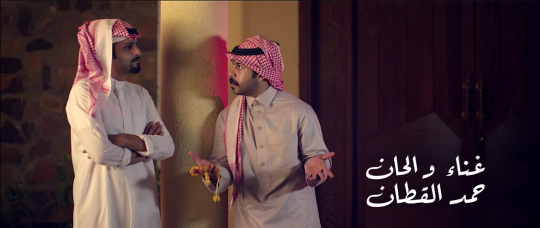
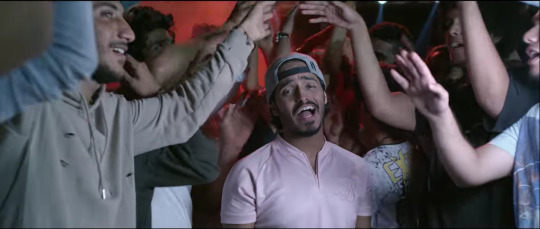
With this extreme exclusion of women in mainstream media, the only forms of which they are represented in regular media are in images of protest. The most notable being the protest against the women’s ban on driving. The images above are two images taken from the Women2Drive campaign. Some, though still wearing a veil, remained topless throughout the protest. However, the question remains, why do women care so much about driving? For a state where “the ideology undergirding the monarchy defines the legitimate ruler as one who will enforce standards of Islamic conduct upon the individual for the good of the community as a whole” (Doumato, 2016) their ban on driving remains a way to preserve the traditional roles of women. Nonetheless, with progressive times, “tensions have grown over how society wishes to define the standards for these Islamic and social values” (Doumato, 2016). Women2drive stands to fight against this ban on driving, opening the doorway for progressive action to take place against a culture that limits the roles women place in social settings. Another image produced by women2drive is one based off the American wartime propaganda promoting for women to join the working class during World War 2. In this new reworking of the original poster, the woman is dressed in a niqab, revealing only the eyes. The words “We can drive” is also added onto the poster under the original message of we can do it. Women2Drive takes this American feminist message and rewrites it, fitting of their Saudi Arabian audience. Though these images do serve well as mediums for political messages to step through, often the seriousness of the situation can be dismissed, but one that the playfulness of music videos can hint at, allowing the message to be received through the façade placed by visuals.
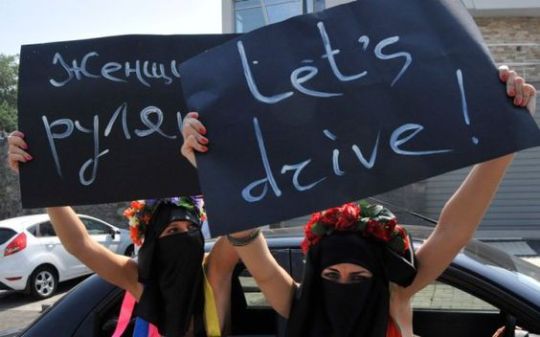
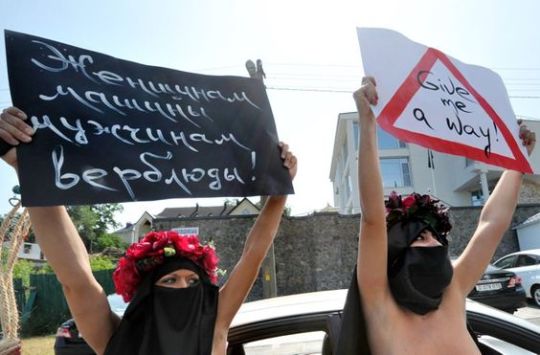
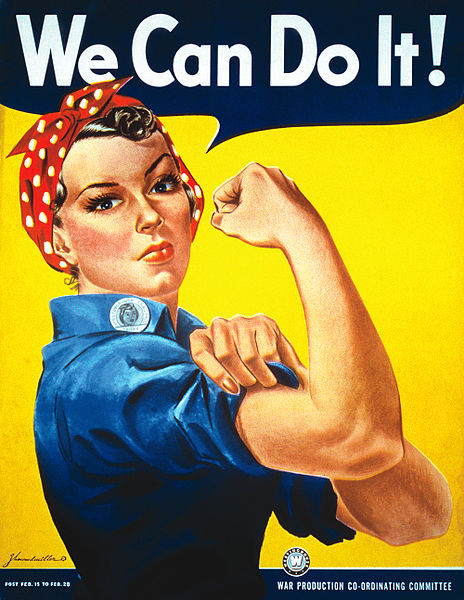



In December 2016, a new music video named Hwages by Majedalesa directed by Majed al-Esa was posted on youtube and gained international attraction. For the first time, a music video from Saudi Arabia featured not only women, but acting freely outside without any visible supervision from men. Since its release, the video has been “viewed more than 2 million times and has become the subject of widespread debate in Saudi Arabia — as well as considerable celebration.” (Taylor, 2017) But why has it become such a viral phenomenon, and what makes it such a controversial music video? The video starts off as six women enter a van all sitting in the back while a child seats himself on the driver’s seat. From this first scene, the notion against the ban on women driving is already set. Keeping to cultural ideals that women, the scene technically does not break any traditional laws by keeping women away from the wheel. Nonetheless, it still shows a ridiculous image of allowing a child to drive rather than the adults in the car. Fighting against the notion on a cultural ban on women driving, it makes its audience question whether this ban seem reasonable as it “emphasizes the hypocrisy of disapproving Saudi men, who can drive freely and travel abroad as they wish” (Taylor, 2017). In another scene, the women now, though still dressed in their full niqab, wear bright colorful shoes and dresses while they skateboard and ride scooters. The scene cuts to two males looking and waving their finger in disapproval. This imagery again, breaks the norms of how a traditional Saudi Arabian women are seen. Free from their male guardianships, they act freely and happily on their own, an act seen as disgusting and even offensive by some Saudi citizens. One tweet by Saudi citizen, Hassan al-Ghamdi announcing, “The director offends the Muslim women in our country. Where are our preachers to deny this?” Perhaps one scene that speaks most directly towards the patriarchal ruling of the country is one where they are bowling in a carnival setting. For a very short moment, the pins are shown to have pictures of men placed on the pin before cutting to a long shot of a woman knowing the pins down. Though it is unclear who the men in the pictures are, the message still exists, using this metaphor of knocking down pins to highlight the need for change towards a more equal ruling between males and females within the country. The video is also laden with references towards American politics, namely the frequent use of a caricature of recently elected president Donald Trump. As the title “Hwages” roughly translates into “concerns” it seems the video speaks not only towards the citizens of its own country but also to the American audience. To Moya Crocket, a writer for The Stylist, she possesses the question in response “Can you stand in moral judgement of other countries’ treatment of women, when you elected this man as president?” (2017). Aside from the colourful, playful visuals, the lyrics also speak very strongly against Saudi Arabian’s female oppressive culture. Roughly translated to “May men go extinct, they have caused us psychiatric diseases”, the lyrics themselves are a reference to a Saudi Arabian protest song released in 2014. While on its own, it’s aggressive lyrics may come off as harsh, paired with the visual of the song, it almost becomes its own satirical existence however still relaying the message of a need for progressive behavior to take place in Saudi Arabia.
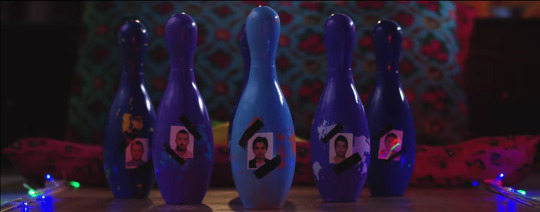
The group behind the video is 8ies studios, a Saudi Arabia based media company who specialize in photography, video and audio production. While the use of women in music video is new to both the company and Saudi Arabian media as a whole, they are no stranger to the production of highly viral videos. Late December of 2015, they released a video called Barbs by Majedalesa which have now gained over 40million views. It’s had become such a viral sensation that it “launched a huge dance craze in the Arab world, leading to the arrest of two in Abu Dhabi who uploaded a video of their own that showed them dancing in military uniform” (Taylor, 2017). Though Barbs has no political message to communication, it exemplifies the studio’s ability to capture a large audience understanding the inner workings of how to create a viral sensation. 8ies Studios acts unafraid of government ruling and as such has created a platform where cultural problems that are seen as controversial can be freely communicated. Even on their website, their mission statement makes the claim “We believe that there are no limits to anything you can do, and no border for any dreams to come true. We build relations and create attitudes. We make an effort and work on another. We look for change and hope to gain.” While no direct comment has been made official by Majed al-Esa, the director of the video, it is clear to see that a political message is being told, allowing the voices of women in Saudi Arabia to be heard and their struggles against their culture to be expressed.
Hwages has picked up not only as an international sensation in its depiction of Saudi Arabian women, but more importantly, has gained political traction sparking controversial debate. It’s controversial ideals have caused many to act disapprovingly, and in response “hardline Islamists have taken to social media to rant against the pop song, decrying it as “cheap”, “inappropriate” and “disgusting”” (JPOST.COM STAFF, 2017). For these fundamentalists, this music video goes against much of their moral and cultural laws of how women should act, existing as a blatant act of perversion on their beliefs. But despite the backlash it has received, the music videos has gained an overwhelming amount of positive feedback as well as support for its take on protest against women’s oppression. Not only from general Saudi citizens, but from powerful political figures as well. Not long after its release “Amera al-Taweel, the 33-year-old ex-wife of prominent Saudi prince Al-Waleed bin Talal, shared the video to her twitter” (Taylor, 2017) and “one of the oldest newspapers in the country, Al-Bilad, offered its own praise for the video, noting that “the new generation of women is different from the past.” (Taylor, 2017). Whether good or bad, the music video has allowed conversation to take place as its circulation throughout the internet creates “active participation in policy debates and articulation of new perspectives.” (Sakr, 2002). As a medium, the video has gone beyond its purpose as an engine driving entertainment towards its viewers but making a political statement as well. Nonetheless, the vast amount of support the video has gained has no doubt shown that perhaps for Saudi Arabia, an era of cultural change is approaching.
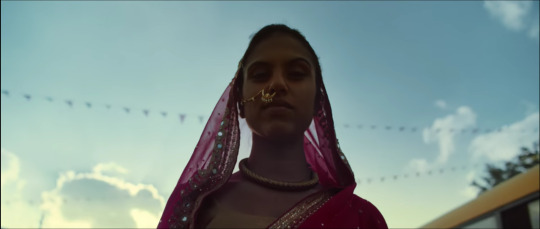
Hwages have paved a new way for media and specifically music videos to represent women and their need to be heard as a people. Existing as a driving force behind progressive movement in a country where conservative beliefs and mindsets are so central to its politics, this music video has allowed a new perspective to be freely discussed. For Saudi Arabia, this could very possibly lead towards a time of change for the women of the country. Representation within the video has allowed women to be empowered as figures that exist as individuals rather than as second class citizens. Seen in such a public scale, acts formerly seen as taboo may lose its grip on women allowing them to act freely. For women to be taken seriously in this regard, it is obvious that representation matters within the media form used to express their freedom. And though images of real life occurrences showing protest and outrage can instill awareness, music videos can reach a much larger audience with its ability to communicate its message through semantics. Hwages successfully infiltrates Saudi Arabian media creating an uprising of voices to be heard. If more music videos were to follow 8ies studios impact, changes would no doubt come to Saudi Arabia, leading to both political and cultural changes allowing both men and women to leave freely. Already it’s influence has travelled overseas where in India, a music video titled Alpha Female directed by Sasha Rainbow takes heavy influence with Hwages to spread the message of female empowerment. Masked in colourful visuals and playful tones, this political act stands above many others fostering a mindset enlightening its international audience as well as gathering support within the country for human rights. As a music video not only does it entertain but radically challenges the country its government to think differently. Nonetheless, the issue of allowing women to drive is only a gateway into the world of restrictions Saudi Arabian women are faced with. In the end, the issue goes beyond allowing women to drive but allowing them freedom to act independently as individuals free from patriarchal society. No doubt, change is starting to occur within Saudi Arabia, with countless national and international support behind the video’s positive message, it is an inevitable cause that will only lead to propelling this feminist movement forward. Perhaps in the near future, this eastern society will gain as much freedom as those in the west.
References:
Khalife, L. (2017, February 10). A Saudi feminist music video inspired an Indian version. Retrieved March 06, 2017, from http://stepfeed.com/a-saudi-feminist-music-video-inspired-an-indian-version-6123
Kraidy, M. M. (2012). Contention and Circulation in the Digital Middle East: Music Video As Catalyst. Television & New Media, 14(4), 271-285. doi:10.1177/1527476412463450
Kraidy, M. M. (2013). Contention and Circulation in the Digital Middle East. Television & New Media,14(4), 271-285. doi:10.1177/1527476412463450
Sakr, N. (2004). Women and media in the Middle East: power through self-expression. London: I.B. Tauris.
Sakr, N. (n.d.). Volume 69 Number 3 (Fall 2002) The Status of Women in the Developing World. Retrieved January 24, 2017, from https://epay.newschool.edu/C21120_ustores/web/product_detail.jsp?PRODUCTID=5228pp. 821-850
Taylor, A. (2017, January 03). A music video featuring skateboarding women has Saudi Arabia entranced. Retrieved March 06, 2017, from https://www.washingtonpost.com/news/worldviews/wp/2017/01/03/a-music-video-featuring-skateboarding-women-has-saudi-arabia-entranced/?utm_term=.4cbb5fe44cb3
WATCH: 'God, rid us of men' implores viral Saudi feminist song. (n.d.). Retrieved March 06, 2017, from http://www.jpost.com/Middle-East/WATCH-God-rid-us-of-men-implores-viral-Saudi-feminist-song-477445
0 notes